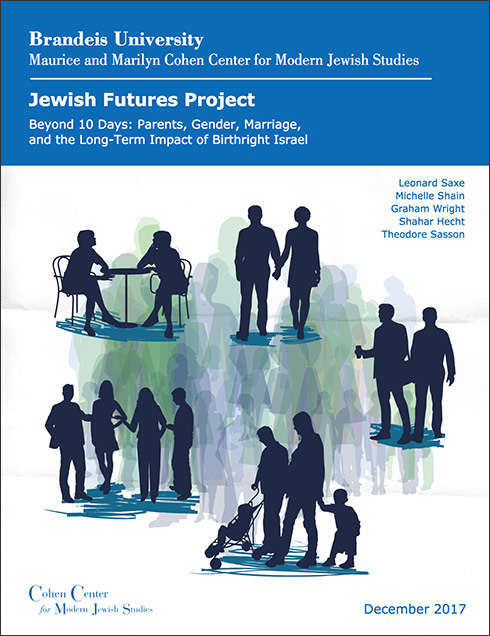Jewish Futures Project. Beyond 10 Days: Parents, Gender, Marriage, and the Long-term Impact of Birthright Israel
Leonard Saxe, Michelle Shain, Graham Wright, Shahar Hecht, and Theodore Sasson
December 2017
 Beyond 10 days: Parents, Gender, Marriage, and the Long-term Impact of Birthright Israel presents findings from the 5th wave of a longitudinal panel study of several thousand Jewish young adults who applied to Birthright between 2001 and 2009.
Beyond 10 days: Parents, Gender, Marriage, and the Long-term Impact of Birthright Israel presents findings from the 5th wave of a longitudinal panel study of several thousand Jewish young adults who applied to Birthright between 2001 and 2009.
The panelists include those who went on a Birthright trip and a control group of those who applied to the program but did not participate. The oldest individuals are currently in their early 40s and a growing number are in their 30s. Many of the panelists are now married, established in their careers, and have young children. In this report we continue to examine the impact Birthright has had on their Jewish choices in adulthood.
This report also examines the ways in which Birthright's impact manifests in different subgroups: those with one versus two Jewish parents, those whose sole Israel experience was a Birthright trip, participants who are single versus partnered, and men versus women.
Key Findings
- Birthright participants are more likely to feel a connection to Israel, have a Jewish spouse, raise Jewish children and be engaged in Jewish life, even a decade or more after the trip.
- In contrast to reports of "distancing" from Israel among young American Jews, Birthright's effect on connection to Israel persists and is significant. Most JFP panelists feel at least "somewhat" connected to Israel, and participants report higher levels of connection than their nonparticipant peers.
- Birthright's effect on participants with one Jewish parent is similar to that on participants with two Jewish parents.Compared to nonparticipants, Birthright participants who have one Jewish parent remain more connected to Israel a decade or more after their trip. They are also more likely to have a Jewish spouse.
- Birthright's impact is evident even for participants who have had no other Israel experience, when compared to similar nonparticipants who have never been to Israel.
- Among those who are married, engaged, or living with a partner, Birthright has a positive impact on virtually all areas of Jewish engagement, including Jewish communal involvement, social and cultural engagement, and religious observance. Among those who are not partnered, Birthright has an impact on only a few measures of Jewish engagement.
- The impact of Birthright on partner choice is different for men and women. For men, Birthright participation has a positive impact on having a Jewish spouse, fiance/e or partner; a positive impact on the likelihood of spousal conversion to Judaism; and a positive impact on the likelihood that children are being raised Jewish by religion, even if the other parent is not Jewish. These effects are weaker for women. This difference may be related to traditional Jewish views on matrilineal descent or gender dynamics in the contemporary "marriage market."
- For men who participated in Birthright, their greater likelihood of marrying a Jewish spouse decreases as their age at marriage increases. Among men who married after age 30, there are no differences between participants and nonparticipants in terms of their likelihood of marrying a Jewish spouse. Whether the diminishing impact of Birthright on spousal choice as participants age is due to changes in participants' priorities, their opportunities in the marriage market, or a combination of both is not clear.